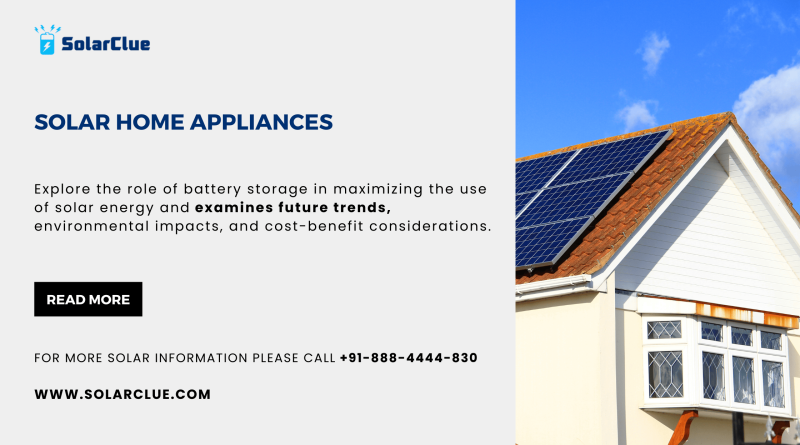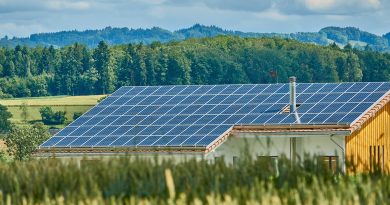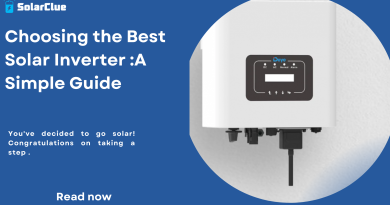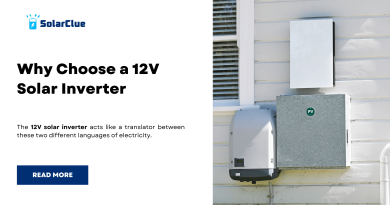Solar Home Appliances
Solar home appliances are becoming increasingly popular as part of the move towards renewable energy and sustainability. This blog explores the types of appliances that can be powered by solar energy, their advantages and limitations, and factors to consider when choosing and integrating solar appliances into a home energy system. It also highlights the role of battery storage in maximizing the use of solar energy and examines future trends, environmental impacts, and cost-benefit considerations.
Table of Contents
- 1 Types of Solar Home Appliances
- 1.1 Direct Current (DC) Appliances
- 1.2 Advantages and Disadvantages of Solar Appliances
- 1.3 Factors to Consider When Choosing Solar Appliances
- 1.4 Integrating Solar Appliances into a Home Energy System
- 1.5 The Role of Battery Storage in Solar Appliance Usage
- 1.6 Future Trends in Solar Home Appliances
- 1.7 The Environmental Impact of Solar Appliances
- 1.8 Cost-Benefit Analysis of Solar Home Appliances
- 1.9 Conclusion
- 1.10 FAQs
Types of Solar Home Appliances
Solar appliances can be categorized into two main types based on the type of current they use:
Direct Current (DC) Appliances
DC appliances are designed to run on the direct current produced by solar panels. These appliances are often more efficient because they do not require an inverter to convert DC to AC.
Examples:
- Solar refrigerators
- Solar air conditioners
- Solar water heaters
- Solar lighting systems
Alternating Current (AC) Appliances
AC appliances run on alternating current and are typically the standard appliances found in homes. To power these with solar energy, the DC output from the solar panels must be converted to AC using an inverter.
Examples:
- Solar-powered washing machines
- Solar ovens
- Solar-powered fans
- Solar televisions
Advantages and Disadvantages of Solar Appliances
Advantages
- Energy Savings: Solar appliances reduce electricity bills by using free solar energy.
- Environmental Impact: They help reduce carbon footprint and reliance on fossil fuels.
- Energy Independence: Solar appliances can provide power during grid outages.
- Long-term Investment: Over time, the savings on energy bills can offset the initial cost.
Disadvantages
- Initial Cost: Higher upfront costs compared to conventional appliances.
- Weather Dependency: Solar energy production is affected by weather conditions and daylight availability.
- Space Requirement: Adequate roof or ground space is needed for solar panel installation.
- Storage Needs: Effective use may require battery storage systems, adding to the cost.
Factors to Consider When Choosing Solar Appliances
Efficiency
- Energy Efficiency: Look for appliances with high energy efficiency ratings to maximize solar energy use.
- Power Consumption: Consider the power consumption of the appliance and whether your solar system can support it.
Cost
- Initial Investment: Evaluate the upfront cost of the appliance and compare it to potential long-term savings.
- Maintenance Costs: Factor in any maintenance or repair costs over the appliance’s lifespan.
Compatibility
- System Compatibility: Ensure the appliance is compatible with your existing solar power system, including the inverter and battery storage.
- Voltage Requirements: Check the voltage requirements of the appliance to ensure it matches your solar power system’s output.
Integrating Solar Appliances into a Home Energy System
System Design
- Solar Panel Capacity: Ensure your solar panel system has enough capacity to power all intended appliances.
- Inverter Size: The inverter should be appropriately sized to handle the total load of all connected appliances.
Installation
- Professional Installation: For optimal performance and safety, have solar appliances installed by a professional.
- Proper Siting: Position solar panels and appliances to maximize sunlight exposure and efficiency.
The Role of Battery Storage in Solar Appliance Usage
Battery storage is crucial for maximizing the use of solar energy, especially for appliances that need power during non-sunlight hours.
Benefits of Battery Storage
- Energy Availability: Provides power during the night or cloudy days.
- Grid Independence: Enhances energy independence by storing excess solar energy.
- Load Management: Helps manage and distribute energy load more efficiently.
Types of Batteries
- Lead-Acid Batteries: Cost-effective but have a shorter lifespan and lower efficiency.
- Lithium-Ion Batteries: More expensive but offer longer lifespan, higher efficiency, and better performance.
Future Trends in Solar Home Appliances
Smart Appliances
Integration of smart technology allows better energy management and automation, enhancing the efficiency and convenience of solar appliances.
Improved Efficiency
Continuous advancements in technology are leading to more energy-efficient solar appliances, reducing overall energy consumption and improving performance.
Integration with Smart Grids
Future solar appliances may integrate more seamlessly with smart grids, allowing for better energy distribution and management.
The Environmental Impact of Solar Appliances
Solar appliances significantly reduce greenhouse gas emissions and reliance on non-renewable energy sources. By utilizing solar energy, they contribute to a reduction in environmental pollution and help combat climate change.
Cost-Benefit Analysis of Solar Home Appliances
Initial Investment vs. Long-term Savings
While solar appliances typically have a higher upfront cost, the long-term savings on electricity bills can be substantial. It’s important to calculate the payback period and total savings over the appliance’s lifespan.
Incentives and Rebates
Government incentives and rebates can significantly reduce the initial cost of solar appliances, making them more affordable.
Conclusion
Solar home appliances offer numerous benefits, including energy savings, environmental impact, and energy independence. By understanding the different types of solar appliances, their advantages and limitations, and how to effectively integrate them into a home energy system, homeowners can make informed decisions that optimize their solar energy use. The role of battery storage, future trends, and a thorough cost-benefit analysis are essential considerations for maximizing the benefits of solar home appliances.
Here at SolarClue®, we offer a smart, practical, and “beautiful” solution. You will be answered for all the questions related to Solar.
We provide all kinds of brands that are the Best Solar panels in India.
If you are the one who is planning for the solar power system. Don’t hesitate to contact our team!
Looking forward to empowering you with solar energy, just like hundreds of our other clients!
FAQs
1. What are the main types of solar home appliances?
Solar home appliances can be classified into DC (direct current) appliances, such as solar refrigerators and solar water heaters, and AC (alternating current) appliances, such as solar-powered washing machines and solar ovens.
2. What are the advantages of using solar appliances?
Solar appliances offer energy savings, reduced environmental impact, energy independence, and long-term cost benefits.
3. What factors should I consider when choosing solar appliances?
Consider efficiency, cost, and compatibility with your existing solar power system.
4. How does battery storage enhance the use of solar appliances?
Battery storage ensures energy availability during non-sunlight hours, enhances grid independence, and helps manage energy loads more efficiently.
5. What are the future trends in solar home appliances?
Future trends include the integration of smart technology, improved efficiency, and better integration with smart grids.




